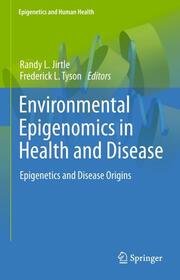Detailansicht
Environmental Epigenomics in Health and Disease
Epigenetics and Disease Origins, Epigenetics and Human Health
ISBN/EAN: 9783642427282
Umbreit-Nr.: 8271925
Sprache:
Englisch
Umfang: xv, 302 S.
Format in cm:
Einband:
kartoniertes Buch
Erschienen am 15.06.2015
Auflage: 1/2015
€ 213,99
(inklusive MwSt.)
Nachfragen
- Zusatztext
- There are now compelling human epidemiological and animal experimental data that indicate the risk of developing adult-onset complex diseases and neurological disorders are influenced by persistent epigenetic adaptations in response to prenatal and early postnatal exposures to environmental factors. Epigenetics refers to heritable changes in gene function that occur without a change in the sequence of the DNA. The main components of the epigenetic code are DNA methylation, histone modifications, and non-coding RNAs. The epigenetic programs are established as stem cell differentiate during embryogenesis, and they are normally faithfully reproduced during mitosis. Moreover, they can also be maintained during meiosis, resulting in epigenetic transgenerational disease inheritance, and also potentially introducing phenotypic variation that is selected for in the evolution of new species. The objective of this book is to provide evidence that environmental exposures during early development can alter the risk of developing medical conditions, such as asthma, autism, cancer, cardiovascular disease, diabetes, obesity, and schizophrenia later in life by modifying the epigenome.
- Kurztext
- Exposure to environmental toxicants is associated with changes in DNA methylation and gene expression profiles that together can contribute to increased disease susceptibility. The chapters in this volume, Environmental Epigenomics in Health and Disease - Epigenetics and Disease Origins, address a wide range of environmental exposures, such as airborne particulates, cocaine, radiation, tobacco smoke, and xenoestrogens. Particular emphasis is placed on the consequences of environmental exposures during development on epigenetic reprogramming that influences adult disease pathogenesis. Health outcomes associated with these exposures include autoimmune disorders, neurodevelopmental disorders, and cancer. Importantly, dietary supplements and drugs can modify the epigenetic effects induced by these agents, thereby reducing their toxicological impact. The overall purpose of this volume and its companion, Environmental Epigenomics in Health and Disease - Epigenetics and Complex Diseases, is to give readers an overview of how environmental exposures during early development can influence disease formation by disrupting epigenetic processes and developmental programming.
